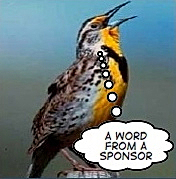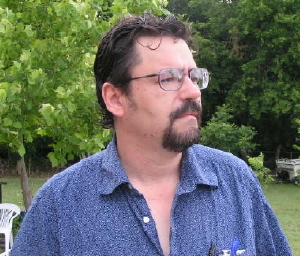* It's a Hormonic Imbalance
So George Bush fucks up again: "childrens do learn. . . ." There's plenty of Hopi, and Lakota, elders who say that a precise use of language = a healthy culture. I fear for "ours."
—Including "Radio Rants" on Conservative Talk Show Pundits; Bird-Brained Environmental-Wacko Diatribes; Mixed-Blood Native Musings; and more . . .
So George Bush fucks up again: "childrens do learn. . . ." There's plenty of Hopi, and Lakota, elders who say that a precise use of language = a healthy culture. I fear for "ours."
Posted by
Tom Gannon
at
5:53 PM
0
comments
![]()
Labels: Media/Language, Media/Politics, Native_America
Posted by
Tom Gannon
at
4:32 PM
2
comments
![]()
Labels: Birds, Humor, John+Martha, Photo/Picture
. . . to quote some game they're playing on a call-in radio show right now. But it occurs to me: there's really only ONE ocean, or else they'd just be REALLY BIG LAKES.
Posted by
Tom Gannon
at
2:16 PM
0
comments
![]()
Labels: Ecology, Media/Language
It beats me how public television can consider itself educational sometimes. So I'm surfing by this "educational" show set in a bookstore—and stop because the bookstore person is talking about the fact that the Beat writers used to frequent the place. When the interviewer asks what "Beat" means, our literary expert explains, "It was called Beat poetry because it had a rhythm to it"!?!? (Yeh, sure; hit that bongo, man.) Jack Kerouac, that beatific hipster, must be rolling in his grave.
Posted by
Tom Gannon
at
7:34 AM
2
comments
![]()
Labels: Literature/Crit_Theory, Teaching/Students
Thanks, Mr. Savage—you've given me a better title for my ENGL 945 course. Last night (9/5), you made reference to "wackjob moron feminist treehuggers." What an interesting appellation! Henceforth, then, I think I should call my Native Ecofeminist class "Wackjob Moron Feminist Treehugger Squaws." Okay, maybe squaw isn't a word you'd be brazen enough to utter on the radio, but I assume it's an epithet that swims around comfortably in your consciousness.
Posted by
Tom Gannon
at
4:49 AM
0
comments
![]()
Labels: Ecology, Literature/Crit_Theory, Media/Language, Media/Sexuality, Native_America, Radio_Rant, Teaching/Students
One of the Stepford-blonde newsreaders on Fox News describing Mt. Aetna's 1,000-feet-high lava eruption: "Look at that! Kinda reminds me of one those lava lamps." Okay, yeh. Nice original & effective comparison, there. Sure. (Her description kinda reminds me, actually, of a sentence from an old web list of worst student figures of speech: "The red brick wall was the color of a brick-red Crayola crayon." You bet.)
Posted by
Tom Gannon
at
10:59 AM
0
comments
![]()
Labels: Media/Language
Last night (9/4), Michael Savage was slamming a San Francisco "hippie reenactment" of the 1967 Summer of Love. The event began with "some Native Americans shamans" [sic], Savage said, or read—adding, "Shamed men, you mean. Ashamed to go back to their reservation!" This may have been true, actually, on a level beyond our commentator's ken (and shaman is a dangerous & problematic word itself); but no, Michael was just offering another gratuitous knee-jerk insensitive racist dig at a minority group, the kind of kick in the side his audience has grown to know, love, & expect.
Posted by
Tom Gannon
at
7:20 AM
0
comments
![]()
Labels: Media/Religion, Native_America, Radio_Rant
| A colleague just turned me on to an editorial in the Omaha World Herald a few months back (23 June 2007 [7B]), by a professor at the University of Nebraska-Kearney who has set himself up as another Apostle of Culture, as one more Savior of High Literature. Doctor Thomas Martin laments the fact that students at the U of Nebraska-Lincoln don't even have to take a course in Shakespeare to acquire a major in English. I, too, lament the fact that English students (graduate students, more crucially) aren't exposed to all the major eras & figures of British and American literature. But I also think that they should have to read some Continental literature in translation (Dostoevski, Goethe, and the like); and maybe a course in Spanish(-American) lit., from Cervantes through García Márquez?; and some American Indigenous lit. would be a good idea, too. Ay, there's the rub: where should one stop, given the economic pressures that English departments currently face? In fact, Martin asserts that majoring in English sans Shakespeare is "comparable to a medical doctor who did not take a course in anatomy." This analogy is, first of all, completely absurd on the level of logical categories. But it also ignores the fact that Shakespeare himself, as literary historians remind us, was never the Great-Be-All-and-End-All of the English canon until well into the nineteenth century, and that the canon of "essential works" of which Martin speaks is itself a historically constituted body. This lack of historicity is Martin's main problem. For him, "literature" still has an "essential quality"; it is still "timeless," and its theme is an unchanging "human nature." (And someone play "God Save the Queen," while we're at it.) But literature, in reality, is always situated in place, and time, and ideology: there's never anything disinterestedly "eternal" about it. And yet he complains that English departments have turned "into sociology departments, emphasizing the topical literature of race, gender, class and ethnicity over the traditional works of literature." Huh? Shakespeare's corpus, too, we recognize, is a "topical" one, utterly involved in "race, gender, class and ethnicity." This recent turn of events—our "sociological" or political focus—is merely evidence that we are now conscious how all texts are inescapably complicit in such politics. Professor Martin also claims that the "faculty in most modern institutions of higher learning lack respect for their ancestors," who are —as is clear later in the editorial—the good ol' dead white English males. But ancestors is a strange word, when mine happen to include the non-white and non-European. Can't I be true to mine? (And all of them?!: what fun to teach Black Elk, and James Joyce, and Albert Camus in the same course!) Martin's entire argument, in sum, is quite an ethno/Eurocentric one. Other once-upon-a-time word choices that Martin tosses around include "liberal education," "spirit," "conscience," and "reasoned"—all of which smack of Matthew Arnold and other self-anointed Apostles of Culture—and all these all-too-humans have had their own self-interested, political reasons for appealing to such values! Our latest apostle here is finally so bold as to speak of the "moral in a classical work" as something of great use in one's Socratic "self-examination." Ah—for indeed, Martin finally admits—his "discipline is philosophy," after all, and his castigation of the English discipline arises from someone no doubt deeply immersed in a much higher calling than mere "literature," all mere shadows, sophistry, and illusion compared to his calling. We must thank him, then, for descending, if only momentarily, from the Clouds (. . . of Aristophanes). |
Posted by
Tom Gannon
at
8:48 PM
0
comments
![]()
Labels: Literature/Crit_Theory, Native_America, Poco_Theory, Religion/Philosophy
Why are those "Funniest Home Videos" TV shows still so popular (in syndication, at least)? Maybe because they're the closest thing to a real reminder that humans aren't truly in control of their own destiny? Or better—we really don't want to know this truth about ourselves; it's far preferable instead to project this anxious knowledge upon others (e.g., the dad catching the ball from his son's bat in the groin). No one wants to recognize that, at last, we're all sailors in Stephen Crane's "The Open Boat," forever at the whim of the random farts of fortune.
Posted by
Tom Gannon
at
8:31 AM
0
comments
![]()
Labels: Media/Morality, Religion/Philosophy

